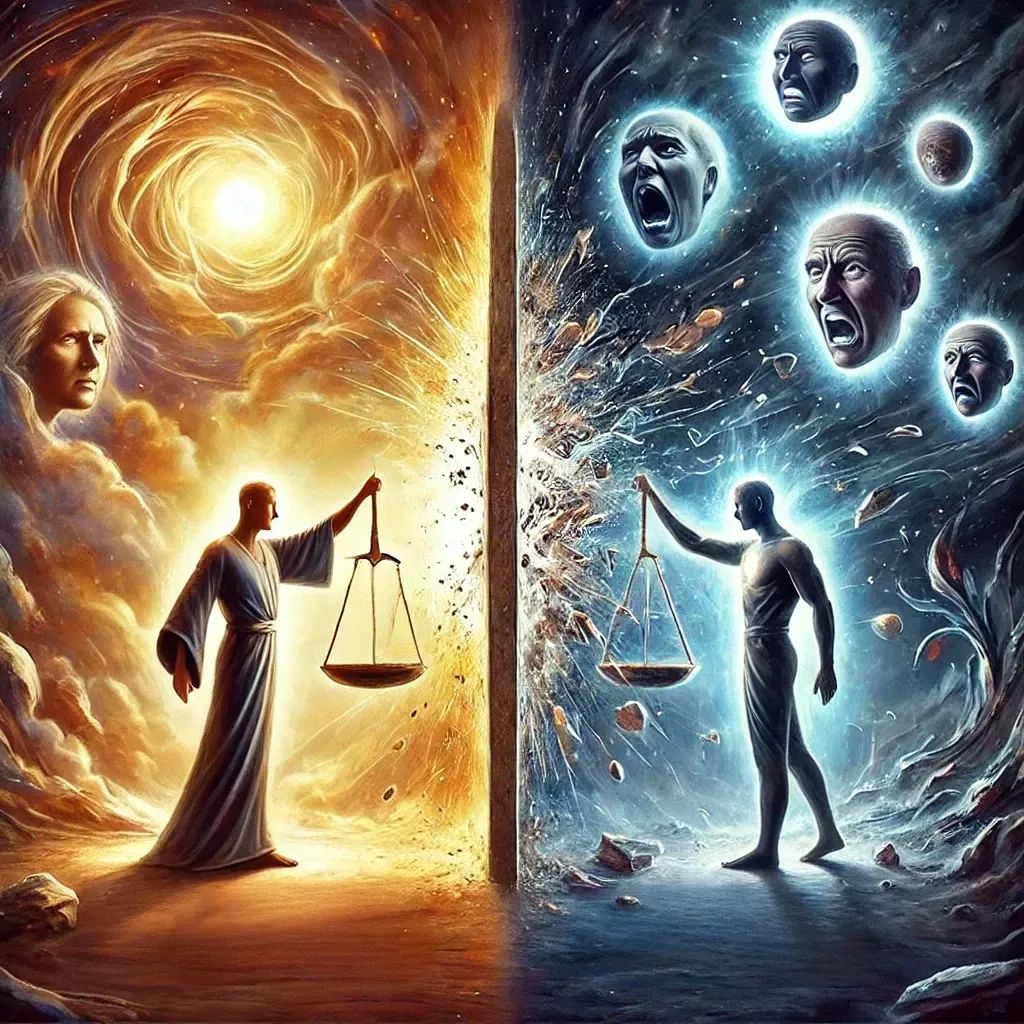INVINCIBLE KINGDOM BLOG

Healthy vs. Toxic Judgment: Social Media Discernment We Desperately Need NOW
In today’s hyper-polarized world, social media has become a battleground of opinions, outrage, and unchecked judgment. Now more than ever, we need true discernment…the ability to separate wisdom from reaction, truth from projection, and accountability from toxic condemnation.
The word "judgment" has been distorted. Many have been conditioned…whether by culture, media, or misguided spirituality…to believe all judgment is wrong. But judgment itself is not the problem. The question is: Is your judgment rooted in clarity and truth, or is it fueled by fear, ego, and unresolved wounds?
This post will help you recognize the difference between toxic projection and healthy discernment…so you can navigate conversations, news, and social media with wisdom instead of reactivity.
Healthy Judgment (Discernment, Wisdom, Authenticity)
Based in Clarity & Objectivity – Rooted in truth rather than emotional reaction.
Supports Growth & Protection – Encourages wise decisions that protect and uplift.
Comes from a Centered State – Arises from stillness, presence, and clarity, not fear or control.
Sees the Full Context – Acknowledges nuances instead of jumping to conclusions.
Oriented Toward Truth & Responsibility – Helps us respond wisely, not react impulsively.
Compassionate & Non-Attached – Recognizes issues without condemnation.
Holds Humility – Aware that one’s perspective is always incomplete.
Seeks Understanding Before Conclusion – Open to deeper truths instead of assuming. Asks questions for clarity.
Examples of Healthy Judgment (Discernment) in Social Media & Politics
Recognizing media bias – Acknowledging that different news sources have biases and critically evaluating multiple perspectives before forming an opinion.
Calling out harmful policies without vilifying individuals – Critiquing a political decision based on its impact while avoiding personal attacks on those implementing it.
Holding influencers and leaders accountable – Questioning misinformation spread by public figures while focusing on truth and integrity rather than engaging in character assassination.
Distinguishing between policy disagreement and moral failure – Understanding that someone can hold a different viewpoint on a policy issue without being a fundamentally bad person.
Engaging in meaningful discussions with opposing views – Seeking to understand why someone believes differently rather than immediately dismissing them as ignorant or evil.
Fact-checking before sharing news or opinions – Taking a moment to verify the credibility of information before amplifying it on social media.
Setting boundaries instead of feeding into negativity – Choosing to disengage from unproductive arguments rather than attacking or trying to "win" a debate.
Toxic Judgment (Projection, Shadow-Based, Inauthenticity)
Based in Emotional Reactivity – Stems from personal wounds and insecurities.
Driven by Fear, Ego, or Control – Used to maintain superiority or avoid discomfort.
Distorted Perception – Projects inner unresolved issues onto others.
Lacks Empathy & Understanding – Seeks to shame, diminish, or condemn.
Rigid & Absolute – Operates in black-and-white thinking, ignoring complexity.
Defensive & Reactive – Feeds off emotional triggers instead of awareness.
Ego-Maintaining – Protects a false self-image rather than seeking truth.
Dismisses Context & Growth – Labels others harshly without allowing for transformation.
Examples of Unhealthy Judgment (Toxic Projection) in Social Media & Politics
Dismissing someone entirely because of their political affiliation – Assuming that anyone who supports a different party is ignorant, evil, or beyond redemption without considering their personal experiences or reasoning.
Engaging in cancel culture without context – Judging someone harshly for an old social media post without considering growth, intent, or their actions since then.
Reacting with outrage to headlines without reading the full story – Jumping to conclusions and spreading misinformation based on emotional reactions rather than informed understanding.
Believing the worst about political opponents – Assuming malicious intent in every action taken by someone with a different ideology rather than considering human complexity.
Shaming people for not speaking on every issue – Criticizing individuals or influencers for not making a public statement on a trending issue, without considering their personal circumstances or level of knowledge.
Using moral superiority as a weapon – Assuming that one’s perspective is the only "correct" or "righteous" one and demeaning others for not aligning with it.
Spreading unverified claims because they align with personal beliefs – Sharing a viral post or conspiracy theory without verifying its accuracy, simply because it supports one's own political stance.
How to Tell the Difference Between Healthy and Toxic Judgment
Before reacting, pause and ask yourself:
Am I responding from wisdom, or am I reacting from emotional charge?
Is my perspective based on clear discernment, or is it clouded by anger, insecurity, or past wounds?
Am I seeing the full picture, or am I jumping to conclusions based on limited information?
Is this judgment leading to truth, growth, and understanding…or is it feeding division, outrage, or ego?
Am I holding someone accountable in a way that encourages integrity, or am I condemning them to feel superior?
Does this reveal something unresolved in them…or is it actually revealing something unresolved in me?
Can I hold this judgment lightly, remaining open to deeper truth, or am I gripping it as an absolute?
Healthy judgment leads to clarity, growth, and wisdom.
Toxic judgment fuels distortion, division, and projection.
The difference is not in whether we judge…it’s in how and why we do it.
If we slow down and examine our own judgments, we open the door to deeper self-awareness, authentic discernment, and meaningful dialogue.
How have you seen this play out in your life or in social media now? What changes do YOU see that YOU can make? (Not others)
© 2026 | INVINCIBLE KINGDOM INC. ALL RIGHTS RESERVED
Link To Our:
Privacy Policy | Terms Of Service | Earnings Disclaimer | Refund Policy | Code of Ethics

